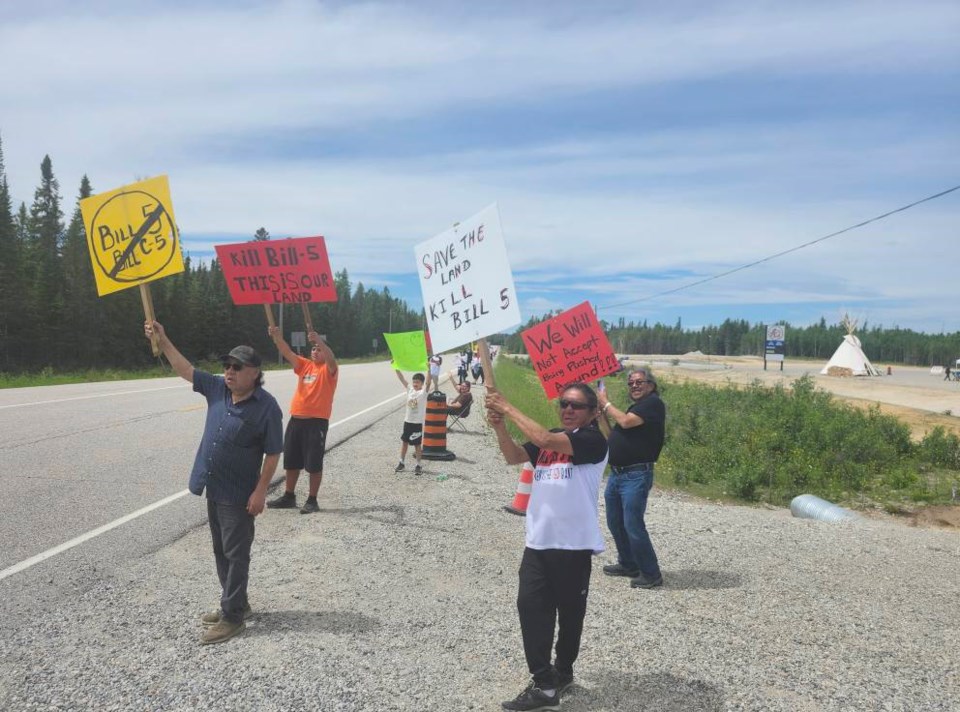TORONTO — A group of Ontario First Nations is asking the courts to declare two new laws unconstitutional.
Nine First Nations in Ontario, including three in the Northwest, have filed an application in Ontario Superior Court that seeks to strike down Ontario’s Protect Ontario by Unleashing our Economy Act (Bill 5) and sections of the federal Building Canada Act (Bill C-5). The application says, in both cases, the legislation “authorizes the Crown to unilaterally ram through projects without meaningful or any engagement with First Nations.”
“Canada and Ontario … need to provide proper infrastructure and economic participation requirements to First Nations,” Ginoogaming Chief Sheri Taylor told a press conference at Queen’s Park in Toronto Wednesday morning. “These are the partnerships and initiatives that will protect the economy.”
“We will not allow our rights and decision-making authority to be stomped upon in order to protect the economy at large,” she continued. “We First Nations are part of the economy and our say on the land matters.”
“We will not allow our rights to be trampled on — these bills do that.”
In Northwestern Ontario, Ginoogaming, Aroland and Kitchenuhmaykoosib Inninuwug are involved in the case; they’re joined by Alderville, Attawapiskat, Fort Albany and Wabauskang First Nations, the Apitipi Anicinapek Nation and Oneida Nation of the Thames.
The First Nations leaders emphasized that First Nations are not opposed to development, but it can’t be done at the expense of their protected rights and the environment.
Kate Kempton, senior counsel at Woodward & Company, the law firm representing the First Nations, said at the press conference that, while the province’s Bill 5 is “in some ways far, far worse than the federal version,” both “give their respective cabinets and ministers unfettered, unlimited authority to wave a magic wand in any instance when approving a project — or what could be a vast area of land or zone for multiple projects — to say that a bunch of other laws are not going to apply.”
“Absolute power corrupts absolutely,” she said. "I think — we think — the general public should be alarmed by this."
Federal and provincial authorities have said the laws were enacted as a response to U.S. President Donald Trump’s tariff war and over the need to bolster the Canadian economy by making it easier to fast-track resource projects.
Kempton said that’s nonsense.
“This isn't about economic development versus no economic development — it’s not about cutting out red tape,” she said in an interview with Newswatch after the press conference. “These are excuses and pieces of propaganda that both levels of government are using to try to ram these things home.”
In an emailed statement to Newswatch, a spokesperson with the Privy Council Office said Canada is “committed to upholding commitments and obligations under the (United Nations Declaration on the Rights of Indigenous Peoples) Act and constitutionally protected rights, including Aboriginal and treaty rights.”
The act “ensures that Indigenous Peoples whose rights may be affected are consulted at key stages,” the spokesperson said, adding that includes before a project is designated as being in the “national interest.” The Privy Council Office said Prime Minister Mark Carney will be meeting with Indigenous leaders “over the coming weeks” in order to “ensure that Indigenous participation is at the heart of the implementation of the Building Canada Act.”
“As Canada has only just received the Notice of Application and is now reviewing it, it would be inappropriate to comment further at this time.”
An emailed statement to Newswatch from the Premier’s Office said the province “will continue to build consensus with First Nations on shared priorities including legacy infrastructure, all-season roads, and resource development that support long-term prosperity.”
The statement said “productive conversations” have begun with First Nations “who share our vision of unlocking economic opportunity and critical infrastructure in their community,” and added that consultations — which will “shape the regulations and criteria for new special economic zones and Indigenous-led economic zones” — will continue throughout the summer.
Taynar Simpson, the chief of Alderville First Nation southeast of Peterborough, said at the press conference that consultation after the fact isn’t good enough.
“When you talk about consulting, we should have been consulted on the Bill 5 legislation on the drafting of that bill from day one,” he said, speaking specifically to the provincial process. “That's where consultation is. You don't have consultation after the fact.”
In Ginoogaming, Taylor said “in regards to Doug Ford and consultation, there has not been anything in regards to Bill 5 in my community from them.”
“There's no meaningful consultation with us as First Nations. And that's why I'm here.”
Kempton said that consultation has been the law in Canada for nearly 30 years. “It's not just sitting down and talking, it's working through issues, identifying problems, identifying concerns and then working through how they will be addressed,” she said.
“Sometimes that means a project can't go ahead because the only way to address it is to say no.”
Now that the application has been filed with the court, Kempton said, the federal and provincial governments still have a chance to reverse course. Should either level of government use their pieces of legislation before the court rules on their constitutionality, the applicants may seek an injunction.
“Politics might be about popularity, but law cannot be,” Kempton said. “Constitutional law is about the continuity of fundamental values that define a society, despite what's popular in the moment or not.”
